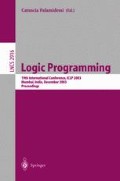Abstract
Many frameworks have been proposed to manage uncertain information in logic programming. Essentially, they differ in the underlying notion of uncertainty and how these uncertainty values, associated to rules and facts, are managed. The goal of this paper is to allow the reasoning with non-uniform default assumptions, i.e. with any arbitrary assignment of default values to the atoms. Informally, rather than to rely on the same default certainty value for all atoms, we allow arbitrary assignments to complete information. To this end, we define both epistemologically and computationally the semantics according to any given assumption. For reasons of generality, we present our work in the framework presented in [17] as a unifying umbrella for many of the proposed approaches to the management of uncertainty in logic programming. Our extension is conservative in the following sense: (i) if we restrict our attention to the usual uniform Open World Assumption, then the semantics reduces to the Kripke-Kleene semantics, and (ii) if we restrict our attention to the uniform Closed World Assumption, then our semantics reduces to the well-founded semantics.
Access this chapter
Tax calculation will be finalised at checkout
Purchases are for personal use only
Preview
Unable to display preview. Download preview PDF.
References
Belnap, N.D.: How a computer should think. In: Ryle, G. (ed.) Contemporary aspects of philosophy, pp. 30–56. Oriel Press, Stocksfield (1977)
Buchanan, B.G., Shortli, E.H.: A model of inexact reasoning in medicine. Mathematical Bioscience 23, 351–379 (1975)
Cao, T.H.: Annotated fuzzy logic programs. Fuzzy Sets and Systems 113(2), 277–298 (2000)
Dubois, D., Lang, J., Prade, H.: Towards possibilistic logic programming. In: Proc. of ICLP 1991, pp. 581–595. MIT Press, Cambridge (1991)
Fitting, M.: The family of stable models. J. of Logic Programming 17, 197–225 (1993)
Fitting, M.: A Kripke-Kleene-semantics for general logic programs. J. of Logic Programming 2, 295–312 (1985)
Fitting, M.: Bilattices and the semantics of logic programming. J. of Logic Programming 11, 91–116 (1991)
Fuhr, N.: Probabilistic Datalog: Implementing logical information retrieval for advanced applications. J. of the American Society for Information Science 51(2), 95–110 (2000)
Gelfond, M., Lifschitz, V.: The stable model semantics for logic programming. In: Proc. of ICLP 1988, pp. 1070–1080. MIT Press, Cambridge (1988)
Gelfond, M., Lifschitz, V.: Classical negation in logic programs and disjunctive databases. New Generation Computing 9(3/4), 365–386 (1991)
Ginsberg, M.L.: Multi-valued logics: a uniform approach to reasoning in artificial intelligence. Computational Intelligence 4, 265–316 (1988)
Kifer, M., Li, A.: On the semantics of rule-based expert systems with uncertainty. In: Gyssens, M., Van Gucht, D., Paredaens, J. (eds.) ICDT 1988. LNCS, vol. 326, pp. 102–117. Springer, Heidelberg (1988)
Kifer, M., Subrahmanian, V.S.: Theory of generalized annotated logic programming and its applications. J. of Logic Programming 12, 335–367 (1992)
Lakshmanan, L.: An epistemic foundation for logic programming with uncertainty. In: Thiagarajan, P.S. (ed.) FSTTCS 1994. LNCS, vol. 880, pp. 89–100. Springer, Heidelberg (1994)
Lakshmanan, L., Sadri, F.: Uncertain deductive databases: a hybrid approach. Information Systems 22(8), 483–508 (1997)
Lakshmanan, L., Shiri, N.: Probabilistic deductive databases. In: Int’l Logic Programming Symposium, pp. 254–268 (1994)
Lakshmanan, L., Shiri, N.: A parametric approach to deductive databases with uncertainty. IEEE Transactions on Knowledge and Data Engineering 13(4), 554–570 (2001)
Loyer, Y., Spyratos, N., Stamate, D.: Integration of Information in Four-valued Logics under Non-Uniform Assumptions. In: Proc. of the 30th IEEE Int. Symp. on Multi-Valued Logics, pp. 185–191. IEEE Press, Los Alamitos (2000)
Loyer, Y., Straccia, U.: Uncertainty and partial non-uniform assumptions in parametric deductive databases. In: Flesca, S., Greco, S., Leone, N., Ianni, G. (eds.) JELIA 2002. LNCS (LNAI), vol. 2424, pp. 271–282. Springer, Heidelberg (2002)
Loyer, Y., Straccia, U.: The well-founded semantics of logic programs over bilattices: an alternative characterisation. TR ISTI-2003-TR-05, ISTI-CNR, Pisa, Italy (2003) (submitted)
Loyer, Y., Spyratos, N., Stamate, D.: Parametrized Semantics of Logic Programs - a unifying approach. Theoretical Computer Science (to appear)
Loyer, Y., Spyratos, N., Stamate, D.: Hypotheses-Based Semantics of Logic Programs in Multi-Valued Logics. ACM Transactions on Computational Logic (to appear)
Lukasiewicz, T.: Fixpoint characterizations for many-valued disjunctive logic programs with probabilistic semantics. In: Eiter, T., Faber, W., Truszczyński, M. (eds.) LPNMR 2001. LNCS (LNAI), vol. 2173, pp. 336–350. Springer, Heidelberg (2001)
Ng, R., Subrahmanian, V.S.: Stable model semantics for probabilistic deductive databases. In: Raś, Z.W., Zemankova, M. (eds.) ISMIS 1991. LNCS, vol. 542, pp. 163–171. Springer, Heidelberg (1991)
Ng, R., Subrahmanian, V.S.: Probabilistic logic programming. Information and Computation 101(2), 150–201 (1993)
Przymusinski, T.C.: Extended stable semantics for normal and disjunctive programs. In: Proc. of ICLP 1990, pp. 459–477. MIT Press, Cambridge (1990)
Shapiro, E.Y.: Logic programs with uncertainties: A tool for implementing rule-based systems. In: Proc. of IJCAI 1983, pp. 529–532 (1983)
Subramanian, V.S.: On the semantics of quantitative logic programs. In: Proc. of 4th IEEE Symp. on Logic Programming, pp. 173–182. Computer Society Press, Los Alamitos (1987)
van Emden, M.H.: Quantitative deduction and its fixpoint theory. J. of Logic Programming 4(1), 37–53 (1986)
van Gelder, A.: The alternating fixpoint of logic programs with negation. In: Proc. of ACM PODS 1989, pp. 1–10 (1989)
van Gelder, A., Ross, K.A., Schlimpf, J.S.: The well-founded semantics for general logic programs. J. of the ACM 38(3), 620–650 (1991)
Wagner, G.: A logical reconstruction of fuzzy inference in databases and logic programs. In: Proc. of IFSA 1997, Prague (1997)
Wagner, G.: Negation in fuzzy and possibilistic logic programs. In: Logic programming and Soft Computing. Research Studies Press (1998)
Zadeh, L.A.: Fuzzy sets. Information and Control 8(3), 338–353 (1965)
Zadeh, L.A.: Fuzzy sets as a basis for a theory of possibility. Fuzzy Sets and Systems 1(1), 3–28 (1965)
Author information
Authors and Affiliations
Editor information
Editors and Affiliations
Rights and permissions
Copyright information
© 2003 Springer-Verlag Berlin Heidelberg
About this paper
Cite this paper
Loyer, Y., Straccia, U. (2003). Default Knowledge in Logic Programs with Uncertainty. In: Palamidessi, C. (eds) Logic Programming. ICLP 2003. Lecture Notes in Computer Science, vol 2916. Springer, Berlin, Heidelberg. https://doi.org/10.1007/978-3-540-24599-5_32
Download citation
DOI: https://doi.org/10.1007/978-3-540-24599-5_32
Publisher Name: Springer, Berlin, Heidelberg
Print ISBN: 978-3-540-20642-2
Online ISBN: 978-3-540-24599-5
eBook Packages: Springer Book Archive

